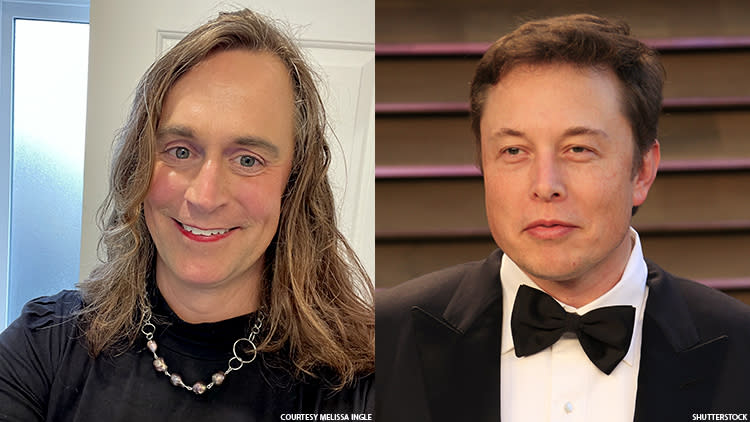Fired Transgender Twitter Employee Speaks Out About Content Moderation

At Twitter, Melissa Ingle worked on civic integrity and political misinformation as a senior data scientist. Before the U.S. and Brazil elections, she wrote algorithms to moderate harmful content on Twitter. She was one of the 4,400 contract staff who was denied access to Twitter's internal systems last month because of Elon Musk's takeover of the social media platform and then fired.
She tells The Advocate that her job involved a lot of data analysis.
"I would help to write the machine learning algorithms and monitor any kind of report on these algorithms that that scroll through Twitter for tweets that violated our terms of service specifically as it involves political misinformation in the [target] country," Ingle says.
"We monitored Brazilian elections, Japanese elections, the E.U., the U.K., Argentina, Mexico," she says. "Anywhere we had a substantial presence."
She says many teams interfaced with each other and collaborated to understand each location's needs.
"We worked cross-functionally with many different teams to help us understand the laws and the policies and also to help us with the human review process," she says.
She explains that content moderation teams dealt with many types of misinformation and hate speech and that the department reflected the health of Twitter.
"So we're the health of Twitter. And this is not anyone's personal health. This is the health of the platform, So that's making the platform a non-toxic environment that people want to spend time on and that the advertisers felt comfortable with associating brands," she says.
"This was, of course, coupled with the human review team, where they're going through the tweets sort of mechanically, hand by hand, and looking to see if things [existed]that violated our terms of service," Ingle says.
She adds, "So I say that to set the stage because what has changed with the massive layoffs is that approximately half of my team of data scientists and senior engineers were laid off seemingly at random. And then, one week later, the vast bulk of the contractors were laid off. And that included me."
Ingle was laid off on November 12, but she was not offered severance or a financial incentive as a contractor.
She says that the severe cuts to staff and Musk's erratic behavior have significantly threatened the platform's stability.
"We've seen a really sharp increase in abuse. And this can be measured," she says. "Before I left, they reported that we were seeing a 50 percent increase in abuse day over day, from the time before Musk purchased [Twitter] to the time when Musk bought it."
A recent report by the Fletcher School at Tufts University shows that the platform is headed in the wrong direction under his leadership - at a particularly inconvenient time.
"And so, in other words, there are no more people there anymore," she says. "There's no more contractors to monitor things, to catch things. And on the other hand, on the machine learning side, only 15 of us initially left. And then the other contractor and I were laid off, leaving 13, and then [on November 17], at least three people walked out in response to Musk's letter demanding they work extremely hardcore hours."
She says that in the long term, the algorithms will get continually worse at detecting hate speech and harassment, which has become evident on the platform since Musk's acquisition.
Ingle also discusses her experience with the lead-up to her termination.
"Before he purchased the company, you know, he was seeing some things that were extremely disparaging towards content moderation, which is my department. So he felt he didn't trust us," she says.
"And this really didn't instill a lot of trust in us," she adds.
She says that the week before Musk's purchase, the environment at the company was chaotic.
But after the acquisition, people became dejected, Ingel says. She says that nobody knew what they should be working on for the first week, including her.
"So I just kept doing what I had been doing, in the hope that I could keep this place relatively free of misinformation," she says.
As a transgender woman, Ingle says she felt supported at Twitter pre-Musk.
"There were a couple of transgender-focused Slack channels, there were LGBTQ-focused channels, and in general, people were free to, you know, live their lives, and my boss and department work were very supportive of my identity."
But, she says, things changed with Musk's arrival.
"Elon Musk has tweeted out quite a few homophobic and transphobic memes, including most recently, the attack on Paul Pelosi," she says. I mean, it's absolutely ridiculous and only serves one purpose, which is to incite homophobia. That's the sole purpose of that."
She says that in the aftermath of Musk's tweets, staff challenged him wanting to know how he can protect LGBTQ+ employees given his history of tweeting misinformation and homophobic and transphobic memes.
"And he just gave this kind of stock answer, 'oh, we're committed to diversity and, you know, honoring all employees' without really specifically trying to address what he or his followers have been doing," she says.
Ingle says that ultimately what's sad is that as a former employee and a power-user of Twitter for more than a decade, the platform has been a catalyst for good, with the Arab Spring and amplifying the Black Lives Matter movement.
"I found an incredibly supportive LGBTQ community just through following people and tailoring with my likes and my retweets my own experience to focus on issues of relevance to this community, and I've learned so much and really been inspired by so much that I've seen."
She adds, "It's just incredibly sad that it might be going away."

